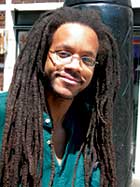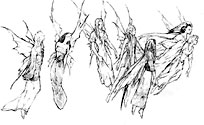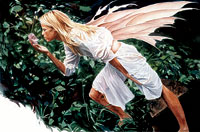 |
“I love my life; I love my job,” announces 31-year-old artist C.J. Randall. “I live in a mansion; I own two cars,” and if he wants to “follow the creative muse,” the artist notes, he doesn’t have to pull a 9-to-5 shift first.
Randall also gets to log significant mileage on the festival circuit, traveling to sci-fi conventions and, as he puts it, “little-old-lady arts-and-crafts fairs, the Renaissance Fair circuit, even some clothing-optional pagan festivals.”

“Procession”
|
“And there’s another festival that’s a weeklong drum-gasm,” adds Randall.
Admittedly, it takes a certain type of person to enjoy spending that much time on the road (namely someone young, unmarried and childless — this artist confesses that he’s not even ready for a dog yet, though he’d like one someday). And while Randall does live in a grand house, his portion of it is only a small apartment. But at an age when most people are digging into the 401(k) track, Randall is making a living, albeit a modest one, solely from his artwork.
And instead of painting arrangements of fruit, seascapes or ambient abstracts, Randall’s subjects are fairies. That’s right: nymphs, sprites, sylphs. The fay. Wee folk. Winged beings.
Waify white women

“The Last Bloom”
|
Fairies aren’t generally considered a guy thing. And for what it’s worth, Randall is African-American besides.
“I’ve gotten some flack over the years for being a black guy who paints Caucasian fairies,” the artist admits. But while we tend to think of these winged beings as having European roots, “There’s a rich [tradition] of fairies in African and Asian culture,” he notes.
Randall says he once served on a panel discussing race and gender stereotypes in art. Five presenters set up unsigned samples of their work, and the audience tried to match art with artist based on what they thought he or she would be compelled to paint or draw.
It’s an interesting question: Why shouldn’t a black guy draw wood nymphs? At the outset, it seems as untoward as, say, an Irishman playing African drums, or a person of Chinese descent becoming a yoga master. But what about local music group the Afromotive? Or internationally renowned yogi Rodney Yee? As the world gets smaller and we all have access to all the cultural knowledge and influence we can stand, maybe the blending of cultures will come to be seen as the norm.
“For now, the pool of who I get to model for me is mostly …” (Randall stops just short of saying “waify white women.”) But a glance at his portfolio reveals few people of color and few men of any heritage.
“You can get into some weird homophobic [fears] if you ask someone to run around half-naked in the woods to model for a fairy painting,” the artist points out.
The art of social change
Randall cuts a mystical figure in long dreadlocks and the occasional flowing outfit, complete with staff. And though the artist abandons his tunic in favor of jeans, T-shirt and bicycle for running errands around town, there’s still something necromantic about him. Is it the ever-present sketchbook? The fact that his speech is peppered with the words “fundamental” and “nexus”?
Yet Randall has recently embarked on a one-man mission to create a different kind of magic. “I’m shooting for world peace and a new Leonardo da Vinci-style renaissance, if that’s [possible],” he reveals. “There are enough people with a concern that an apocalyptic wipeout is possible. … Every time I turn around, I hear another thing that appalls me as an American citizen.” Randall’s cringe list includes the war in Iraq, the state of the health-care system, and nuclear testing in Nevada “right next to a fault line.”
“There are a whole lot of revolutionary people who want to change the world,” he continues. “There’s a lot of energy moving around the country; a lot of people who want to make change. I’m trying to create a nexus project.”



Before you comment
The comments section is here to provide a platform for civil dialogue on the issues we face together as a local community. Xpress is committed to offering this platform for all voices, but when the tone of the discussion gets nasty or strays off topic, we believe many people choose not to participate. Xpress editors are determined to moderate comments to ensure a constructive interchange is maintained. All comments judged not to be in keeping with the spirit of civil discourse will be removed and repeat violators will be banned. See here for our terms of service. Thank you for being part of this effort to promote respectful discussion.